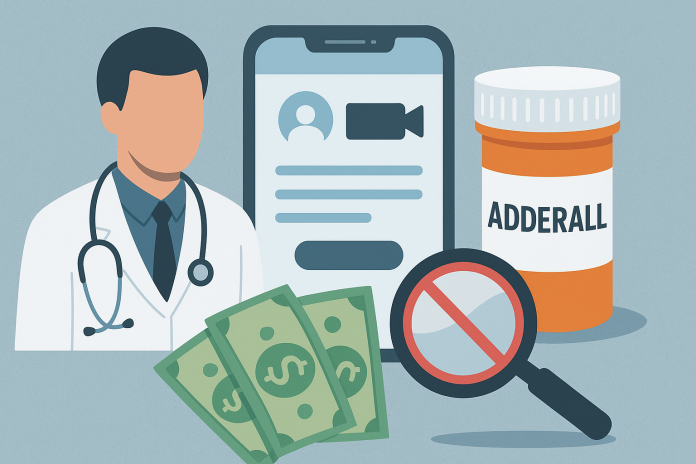A major telehealth company, Done, is now at the centre of a national scandal after its founder, Ruthia He, and its clinical president, David Brody, were convicted for running a huge illegal Adderall distribution and health care fraud scheme. A federal jury in San Francisco found both leaders guilty of making Adderall and other stimulants extremely easy to get online without proper medical care. Prosecutors said the plan lasted for years and was valued at around $100 million.
Done, promoted itself as a fast and modern option for people seeking mental health care, but evidence showed its real goal was to earn large profits by handing out controlled drugs in exchange for monthly subscription fees. More than 40 million pills were distributed through the platform, often with little or no medical oversight.
Investigators found that Done relied heavily on online advertising. The company spent over $40 million on social media ads designed to convince people, especially during the COVID-19 pandemic, that they might have ADHD. Done also bought keyword ads aimed at people searching for ways to obtain Adderall without a legal prescription.
How Done Misled Users and Controlled Medical Staff
Details revealed in court showed that Ruthia He and David Brody built a system aimed at speeding up the prescription process. The first appointment with a medical professional was shorter than a typical psychiatric exam, and many users later received medication through an automatic refill system. These refills required no follow-up calls or video visits. Users simply got an automated message each month, and once they replied, the prescription was sent to a pharmacy.
Some refills were even issued for patients who had already passed away. Families contacted the company to report that their children were experiencing serious problems, including psychosis, addiction, and other dangerous mental health symptoms caused by the medications.
Nurse practitioners were paid up to $60,000 per month to approve these refills without speaking to patients. Brody told nurses to keep prescribing Adderall even when patients were misusing other drugs.
He, who had no medical training, pushed employees to break rules. She said successful technology companies often profit from addictive behaviour and even offered a luxury electric car to employees who helped increase prescription numbers.
False Insurance Claims and Deceptive Medical Records
To keep members paying monthly subscription fees, Done needed insurance companies to cover the cost of Adderall and other stimulants. He, Brody, and others sent false paperwork to Medicare, Medicaid, and private insurers. These forms claimed that Done followed medical guidelines for diagnosing ADHD, including using the DSM-5, and that the company performed urine drug tests and tried non-stimulant medications before prescribing stimulants. Investigators later confirmed that none of this was true.
Because of these false claims, insurers paid more than $14 million for prescriptions that were not medically justified. Prosecutors called this a serious attack on programs meant to help people who depend on public health support.
In 2022, major news outlets began questioning Done’s practices. He and Brody made false statements to investors, pharmacy chains, and the media. They denied that Done used policies that pushed high prescription numbers and claimed the company was led by independent clinical experts. If a patient was denied Adderall, Done encouraged a second opinion to help them receive the medication.
Efforts to Hide Evidence and Escape Investigation
As investigators moved closer to uncovering the full scheme, Ruthia He moved part of the company’s operations to China so that staff and documents would be out of reach. She stopped using normal company communication tools and switched to encrypted apps that deleted messages automatically. She also erased important documents, including ones that encouraged the prescribing of Adderall to people who did not have ADHD.
He transferred more than $1 million to a shell company called Make Believe Asia. She also searched online for countries that did not have extradition agreements with the United States. Law enforcement officers later stopped her as she attempted to leave the country.
After reviewing all of the evidence, the jury convicted both He and Brody of conspiracy to distribute controlled substances, distribution of controlled substances, and conspiracy to commit health care fraud. Ruthia He was also convicted of conspiracy to obstruct justice. Both individuals face up to 20 years in prison for each major charge. Their sentencing is set for Feb. 25, 2026, where a federal judge will determine their punishment.


